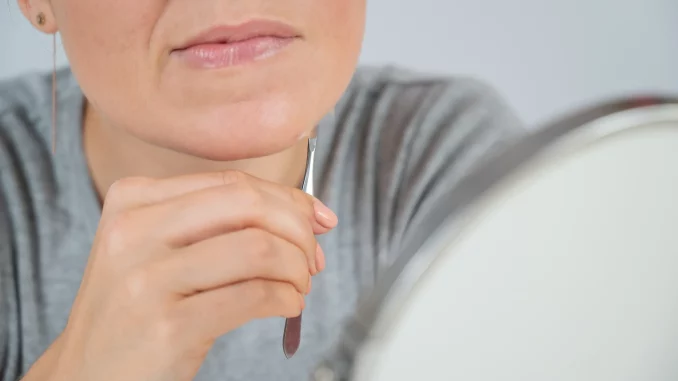
Facial hair is a natural occurrence for both men and women, but excessive or abnormal hair growth in certain areas, such as the chin, can be a cause for concern. If you’re a woman experiencing chin whiskers, it’s essential to pay attention to this symptom and understand what it might indicate. In this article, we will explore the potential causes of chin whiskers in women and what they could mean for your overall health.
1. Hormonal Imbalances
One of the primary reasons behind the development of chin whiskers in women is hormonal imbalances. Increased levels of androgens, often referred to as male hormones, can lead to the growth of coarse, dark hair on the chin. Conditions such as polycystic ovary syndrome (PCOS) and adrenal gland disorders can disrupt hormone levels and contribute to excessive hair growth. If you suspect a hormonal imbalance, consult a healthcare professional who can perform the necessary tests and provide appropriate treatment options.
2. Menopause
During menopause, women experience significant hormonal fluctuations. As estrogen levels decline, androgen levels may become more prominent in the body. This hormonal shift can lead to the development of chin whiskers. If you are in the perimenopausal or menopausal stage of life and notice an increase in chin hair, it may be related to hormonal changes. Discuss your symptoms with a healthcare provider who can provide guidance and management options.
3. Genetics
Sometimes, chin whiskers can be a hereditary trait. If your female family members also have a tendency to develop facial hair, there is a higher likelihood that your chin whiskers are due to genetic factors. While genetics alone may not pose a health concern, it can affect self-esteem and body image. Various hair removal methods are available to manage and reduce the appearance of chin whiskers if desired.
4. Medication and Medical Conditions
Certain medications, such as corticosteroids or medications used to treat epilepsy or hormonal disorders, can cause unwanted hair growth. Additionally, medical conditions such as Cushing’s syndrome or tumors in the ovaries or adrenal glands can contribute to the development of chin whiskers. If you suspect medication or an underlying medical condition as the cause of your chin hair, consult your healthcare provider for a thorough evaluation.
5. Stress and Emotional Well-being
Stress and emotional well-being can impact hormone levels and overall health, potentially leading to changes in hair growth patterns. Chronic stress can disrupt hormonal balance, which may manifest as increased hair growth, including chin whiskers. Engaging in stress management techniques, such as regular exercise, relaxation practices, and seeking support from mental health professionals, can help address these underlying factors.
6. Irregular Skincare and Hair Removal Practices
Frequent plucking, waxing, or other aggressive hair removal methods can sometimes stimulate hair follicles and lead to thicker, coarser regrowth. It is important to adopt gentle and appropriate hair removal techniques to minimize the risk of exacerbating chin whisker growth. Consult a dermatologist or esthetician for guidance on suitable hair removal methods that suit your skin type and specific concerns.
Conclusion
If you’re a woman with chin whiskers, understanding the potential causes behind this symptom is crucial for both your physical and emotional well-being. Hormonal imbalances, menopause, genetics, medication, medical conditions, stress, and skincare practices can all play a role in the development of chin whiskers. Remember that chin whiskers alone may not be indicative of a severe health issue, but it’s important to address any underlying concerns and seek medical advice if necessary. Consulting with healthcare professionals, such as endocrinologists or dermatologists, can provide insight, diagnosis, and appropriate treatment options to help manage chin whiskers effectively.
Share this:
- Click to share on Facebook (Opens in new window)
- Click to share on Twitter (Opens in new window)
- Click to share on WhatsApp (Opens in new window)
- Click to share on Reddit (Opens in new window)
- Click to share on Telegram (Opens in new window)
- Click to share on Pinterest (Opens in new window)
- Click to share on LinkedIn (Opens in new window)